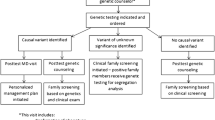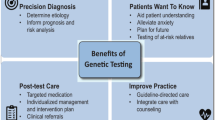Abstract
Purpose of Review
Genetic counseling is an increasingly important component of cardiovascular care in the era of precision medicine.
Recent Findings
Over the last 15 years, genetic testing for inherited cardiovascular diseases has exponentially increased and as such increased the need for complex genetic discussions with patients and their family members. Inherited cardiovascular conditions have an inherent risk for sudden cardiac death, and explaining the risks to at-risk family members and discussing the options for genetic testing to identify those truly at risk is an essential component of complete cardiovascular genetics care. Genetic counselors are trained experts who are increasingly filling this role and embracing the complexities that present as genetic technology evolves.
Summary
The incorporation of genetics into clinical cardiovascular care continues to expand, and genetic counselors play an integral role for families and clinicians.
Similar content being viewed by others
References
Papers of particular interest, published recently, have been highlighted as: •• Of major importance
Woo D, Yeh RW, Turner MB; on behalf of the American Heart Association Statistics Committee and Stroke Statistics Subcommittee. Heart disease and stroke statistics—2016 update: a report from the American Heart Association [published online ahead of print December 16, 2015]. Circulation. doi: 10.1161/CIR.0000000000000350.
Hershberger R, Lindenfeld J, Mestroni L, et al. Genetic evaluation of cardiomyopathy—a Heart Failure Society of America practice guideline. J Card Fail. 2009;15(2):83–97.
Maron, et al. Hypertrophic cardiomyopathy: present and future, with translation into contemporary cardiovascular medicine. J Am Coll Cardiol. 2014;64:83–99.
Towbin JA. Inherited cardiomyopathies. Circ J. 2014;78:2347–56.
Spears DA, Gollob MH. Genetics of inherited primary arrhythmia disorders. Appl Clin Genet. 2015;8:215–33.
Milewicz DM, Carlson AA, Regalado ES. Genetic testing in aortic aneurysm disease: PRO. Cardiol Clin. 2010;28:191–7.
Loeys BL, et al. The revised Ghent nosology for the Marfan syndrome. J Med Genet. 2010;47:476–85.
•• Arscott P, Caleshu C, Kotzer K, Kreykes S, Kruisselbrink T, Orland K, Rigelsky C, Smith E, Spoonamore K, Haidle JL, Marvin M, Ackerman MJ, Hadi A, Mani A, Ommen S, Cherny S. A case for inclusion of genetic counselors in cardiac care: a case for genetic counselors. Cardiol Rev 2015. [Epub ahead of print]. Personalized Medicine Coalition: http://www.personalizedmedicinecoalition.org/Userfiles/PMC-Corporate/file/pmc_age_of_pmc_factsheet.pdf. This review details a series of cases in cardiovascular genetics regarding issues related to cost and utilization of genetic testing. These cases include current information stating that involvement of a genetic counselor promotes the efficient use of healthcare dollars.
•• Priori S, et al. HRS/EHRA/APHRS 2013 expert consensus statement on the diagnosis and management of patients with inherited primary arrhythmia syndromes. Heart Rhythm 2013;10(12):1932–63. Cigna Coverage Policy 0193: http://s-rm3.cigna.com/assets/docs/health-care-professionals/coverage_positions/mm_0193_coveragepositioncriteria_genetic_testing_for_long_qt_syndrome.pdf. Accessed 20 Jan 2016. A detailed consensus statement providing practical information on the diagnosis and management of patients and families with inherited heart disease.
Hiratzka LF, Bakris GL, Beckman JA, et al. 2010 ACCF/AHA/AATS/ACR/ASA/SCA/SCAI/SIR/STS/SVM guidelines for the diagnosis and management of patients with thoracic aortic disease: executive summary. A report of the American College of Cardiology Foundation/American Heart Association Task Force on Practice Guidelines, American Association for Thoracic Surgery, American College of Radiology, American Stroke Association, Society of Cardiovascular Anesthesiologists, Society for Cardiovascular Angiography and Interventions, Society of Interventional Radiology, Society of Thoracic Surgeons, and Society for Vascular Medicine. Catheter Cardiovasc Interv. 2010;76(2):E43–86.
•• Richards S, et al. Standards and guidelines for the interpretation of sequence variants: a joint consensus recommendation of the American College of Medical Genetics and Genomics and the Association for Molecular Pathology. Genet Med 2015 ;17(5):405-24. WHO Resolution adopted by the General Assembly on 25 September 2015 [without reference to a Main Committee (A/70/L.1)] 70/1. Transforming our world: the 2030 Agenda for Sustainable Development. Current recommendations that are implemented in most clinical laboratories on the interpretation of sequence variants in genetic testing.
NIH Genomic Data Sharing Policy https://gds.nih.gov (accessed 1/20/16).
Loeys B, et al. Aneurysm syndromes caused by mutations in the TGF-beta receptor. N Engl J Med. 2006;355(8):788–98.
http://www.myokardia.com (accessed 1/20/16).
http://www.alnylam.com/ (accessed 1/20/16).
•• Middleton O et al., NAME position paper: retaining postmortem samples for genetic testing. Acad Forensic Pathol 2013 3(2):191–4. Healthcare 2015, 3, 830–7; doi:10.3390/healthcare3030830. An important position paper that recommends medical examiners save appropriate samples for postmortem genetic testing.
www.nsgc.org/postmortem. Accessed 20 Jan 2016.
Arch Pathol lab Med Vol 138 November 2014.
Mark Zuckerberg, Tuesday December 1, 2015 FACEBOOK.
Author information
Authors and Affiliations
Corresponding author
Ethics declarations
Disclosure
Lisa Castillo declares that she has no conflict of interest. Heather MacLeod provided an education webinar for Ambry, outside of the submitted work.
Human and Animal Rights and Informed Consent
This article does not contain any studies with human or animal subjects performed by any of the authors.
Additional information
This article is part of the Topical collection on Genetic Counseling and Clinical Testing.
Rights and permissions
About this article
Cite this article
MacLeod, H., Castillo, L. Current Cardiovascular Genetic Counseling. Curr Genet Med Rep 4, 142–146 (2016). https://doi.org/10.1007/s40142-016-0095-0
Published:
Issue Date:
DOI: https://doi.org/10.1007/s40142-016-0095-0




